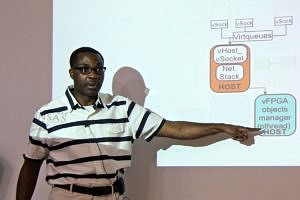06.06.2018 Vortrag Prof. Dr. Christophe Bobda, University of Arkansas, USA
Prof. Christophe Bobda, University of Arkansas, USA, hielt am 6. Juni 2018 im Rahmen des SFB/TRR 89 „InvasIC“-Seminars den Vortrag „Hardware Isolation Framework for Security Mitigation in FPGA-Based Cloud Computing„.

Abstract:
The fast integration of FPGA in computing systems (desktop, embedded, cloud and data center) is pushing resources sharing directly in the hardware, away from the operating system. Cloud computing systems is one example where FPGAs are provided as resources that can be share among several tenants. In an infrastructure as a service (IaaS) paradigm, each tenant can access the hardware directly to accelerate some computations as custom circuits in one or more FPGAs. While these systems introduce application programmers to the energy, flexibility, and performance benefits of FPGAs, integrating FPGAs as shared resources into existing clouds pose new security challenges. The sharing of FPGA resources among cloud tenants can lead to scenarios where accelerators are misused as potential covert channels among guests who reside in different security contexts. Among the ten paradigms (Deception, Separation, Diversity, Consistency, Depth, Discretion, Collection, Correlation, Awareness, Response) used to address security vulnerabilities, separation is one of the most effective approach. The Operating systems’ separation kernels have successfully implemented separation at the software level to isolate application-level threads in separate execution domain and contain potential damages caused by malicious components. We hypothesize that computing systems that extend resource sharing to the hardware, such as FPGAs, can be better protected by providing efficient isolation infrastructure that extends system software separation to hardware components.
The talk will discuss a new security framework that allows controlled sharing and isolated execution of mutually distrusted accelerators in heterogeneous cloud systems. The proposed framework enables the accelerators to transparently inherit software security policies of the virtual machines processes calling them during runtime. This capability allows the system security policies enforcement mechanism to propagate access privilege boundaries expressed at the hypervisor level down to individual hardware accelerators. Furthermore, we present a software/hardware implementation of the proposed security framework that easily and transparently integrates in the hypervisors of today’s cloud systems. Evaluation of security performance and guest VMs execution overhead introduced by the implementation prototype is shows that the proposed framework provides isolated accelerators execution with almost zero execution overhead on guest VMs applications.
Der Vortrag wurde aufgezeichnet und auf unserer „InvasIC“-Webseite zur Verfügung gestellt: http://www.invasic.de.
